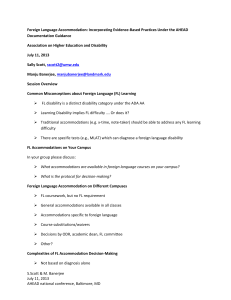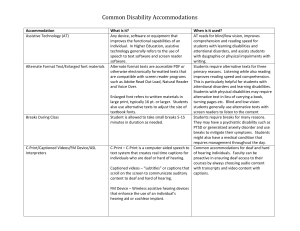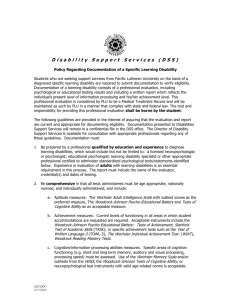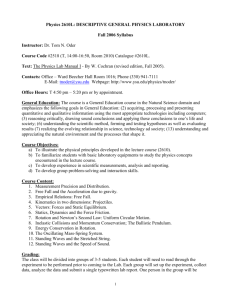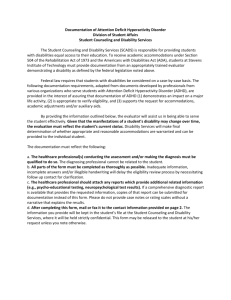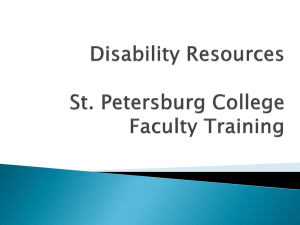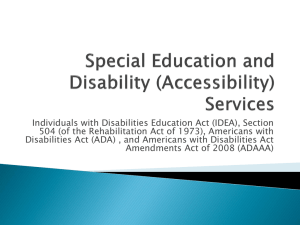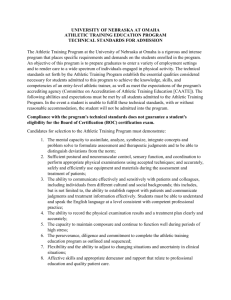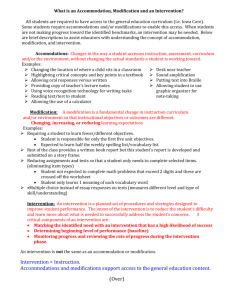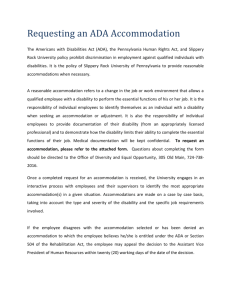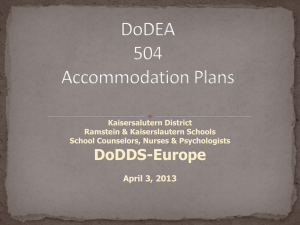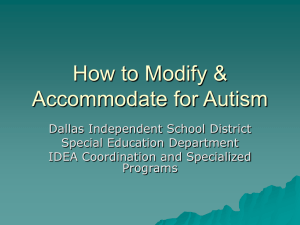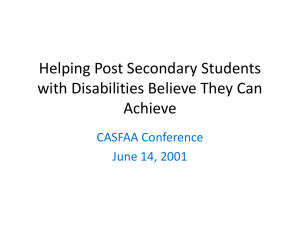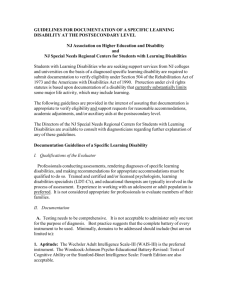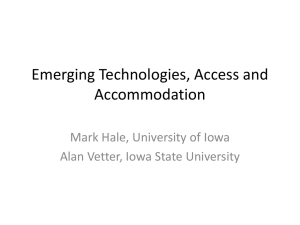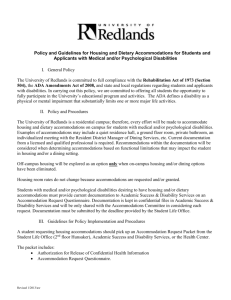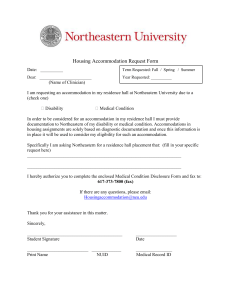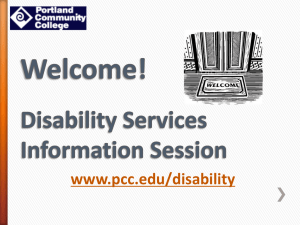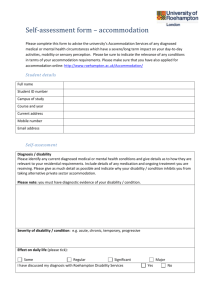ABCD Approach to Management PowerPoint
advertisement
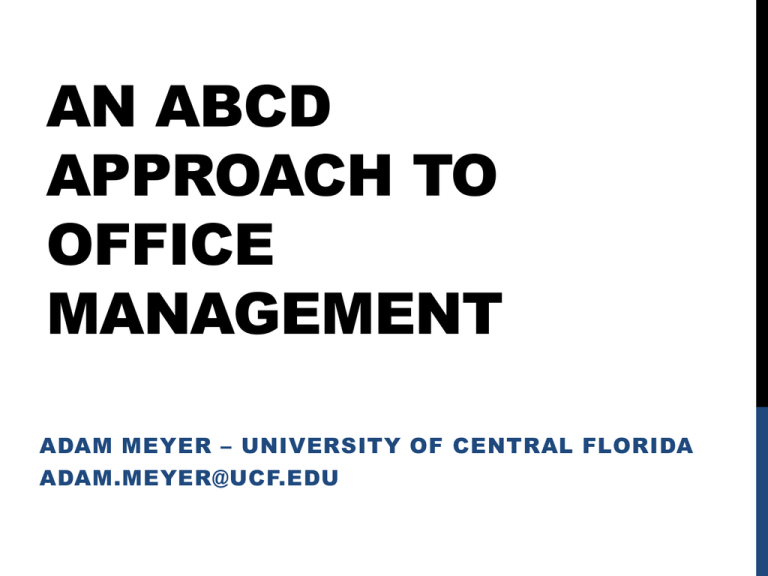
AN ABCD APPROACH TO OFFICE MANAGEMENT ADAM MEYER – UNIVERSITY OF CENTRAL FLORIDA ADAM.MEYER@UCF.EDU KEY TALKING POINTS 1. Awareness of Culture 2. Budgeting 3. Communication 4. Data Reporting **Review of foundational aspects** AWARENESS OF CULTURE IT IS YOUR BUSINESS The disability office is a small business Who are the “customers”? What is the mission of the disability office? Ensuring, creating and maintaining access From a university perspective, not just a student perspective Make policies, procedures and practices work for… Your office Perhaps more importantly, for your “customers” Do you analyze key processes from their point of view? BUILD TRUST Trust is a skill, one that is an aspect of virtually all human practices, cultures, and relationships.(Robert Solomon) To be trusted is a greater compliment than to be loved. (George MacDonald) The Speed of Trust by Stephen M.R. Covey Requires focusing on shared, rather than personal/department goals (OUR students, not MY or YOUR students) Consistent in action, dependable follow-through, openness to communicate (do what, when) Do policies and practices demonstrate that you have the best interest of the students and of the faculty in the name of access? On the extreme end, could any office language use and/or practices be giving subliminal messages that protecting the reputation of the office/oneself is the most important? One conversation, one encounter, one experience at a time LISTEN FIRST, SPEAK LATER To listen well, is as powerful a means of influence as to talk well, and is as essential to all true conversation (Chinese proverb) We have two ears and one tongue so that we would listen more and talk less. (Diogenes) People will feel safer around you and speak truthfully to you when they feel you are listening intently to them. (Brian Koslow) Strategies used: • Meet people in their space, their comfort zone or in a neutral location when possible • Ask them questions first, listen to their story • Use language from their story as the conversation continues (Housing: capacity/fill beds) • Student Advisory Board and Faculty Advisory Board OPERATE WITH THE RESOURCES YOU HAVE, NOT THE RESOURCES YOU WISH YOU HAD. Office policies and practices are not untouchable concepts, immovable objects. What was made can be modified Is your attention where it really needs to be? Are certain practices creating more work than necessary? Focus on what you can change and not on what you cannot change. Internal operations vs. resource allocation The more effective you are internally, the more effective you can be externally about campus and its culture. Any other thoughts on getting a handle on the campus culture? COMMUNICATION SOME THOUGHTS… Listen, listen, listen Genuine and authentic Maintain an open mind Show confidence Concise and clear (to the point) Assess nonverbal cues Think about the impact of messages, especially those conveyed in writing Accommodation letters Office brochures Web information Share critical points first and then descend from there Make the message fit the audience Don’t have the audience conform to the message Under-sell and over-deliver Be aware of internal judgments and irrational thoughts Any other thoughts on or strategies you have used for effective communication? DATA REPORTING WHAT QUANTITATIVE DATA??? Number of students connected with office Disability Specific Accommodations Requested/Used Students by Major and/or College Testing Accommodations Assistive Technology Usage Testing with Assistive Technology Alternative Media ASL/CART/C-Print Usage (and Cost) GPA and possibly probation status Year and/or Credit Hours Completed Survey data (students and faculty) WHAT QUALITATIVE DATA??? Similar student concerns/challenges Similar faculty concerns/challenges Frequent staff observations and assessments HAVE IT? USE IT!! Internal office assessments and action Make any process or communication changes? Assessment is an on-going mindset, not a one-time and occasional event Supervisor and His/Her Supervisor What Quantitative Data?? Monthly, Semester and/or Annual Report Historical trends over 3 – 5 year periods Justification for additional resources Provide in format desired for beneficial use Academic departments Leading Majors with students with disabilities Specific disability consideration…deaf, blind, etc… Other campus stakeholders Increase in Asperger’s…who might be impacted? Use the data for proactive office management and campus outreach What are ways in which you use data to tell and support your story? BUDGETING TWO CONSIDERATIONS Centralized accommodation funding vs. department accommodation funding Disability office budget vs. accommodation budget WHO PAYS? For all associated student accommodation needs (interpreters, book materials, equipment, etc.)… Disability office covers everything? Through the respective home academic departments? Depends…case by case? MONEY SPEAKS When departments contribute to accommodation costs… Accommodations perceived as responsibility of respective unit, NOT as an institutional-wide commitment Students with disabilities seen as a financial drain on department Departments may want more personal/medical information than necessary to justify expenses Debate over who pays can delay provision of access WHAT IS IN A BUDGET? A disability office budget tends to fund: Staff and student worker salaries Office supplies and equipment Database Programming Training and travel Assistive technologies ??? Accommodations Service providers Specialized equipment/technology Braille production Captioning ??? WHEN GOING TO THE SAME BANK… Decisions need to be made to best “balance” the budget Office supplies, office-use equipment, database, programming and travel are negotiable… Are legitimate academic accommodations negotiable? Office operations (daily and for future viability) can be sacrificed to provide accommodations TO BEST SHOW COMMITMENT TO ACCESS… Operate with two funds: Office Operational Fund Staff and student worker salaries Office supplies and equipment Database Programming Training and travel Assistive technologies (predictable “standard” needs) ??? Accommodation Fund Service providers Specialized equipment Braille production Captioning Unpredictable accommodation costs ??? ACCOMMODATION FUND BENEFIT Shows commitment to access Access takes priority even during times of funding challenges Recognizes fluctuation potential (not always predictable) Surplus not seen as negative (poor planning and spending) Consider arrangement where it can go into the red if increase in need (suggest good communication) The disability office work is valued and does not have to sacrifice at expense of accommodations ANALYZE WHERE POSSIBLE Any deaf students in programs requiring internships? Any known upcoming study abroad experiences requiring interpreters? Idea of future semester Braille books needed Consider keeping all standard, predictable expenses with the office budget Any staff salaries Differentiate infrastructure from direct service needs Database expenses Predictable, standard technologies Maintain regular communication with budget administration Discuss variability and rationale Plan for when limit reached/exceeds Other thoughts on beneficial budget practices? Any final questions? Adam Meyer University of Central Florida adam.meyer@ucf.edu



